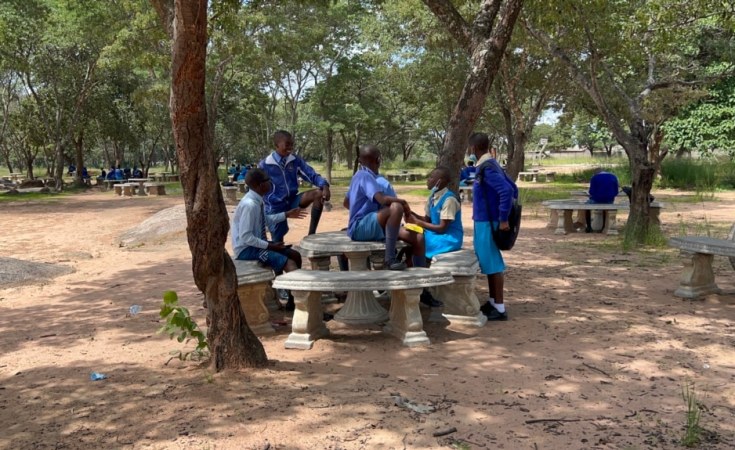Children's learning progress has slowed substantially during the pandemic, roughly equating to a loss of around 35% of the typical learning in a school year, according to a new study.
The analysis drew on 42 studies published between March 2020 and August 2022 from 15 different high- and middle-income countries (although most of the data was from the US, the UK and the Netherlands).
The researchers found that the learning deficits were higher in maths than in reading. They appeared early in the pandemic and remained stable, neither worsening over time (as some had feared) nor significantly improving.
So it appears that initiatives aimed at limiting the negative effects of school closures, such as online learning resources for home schooling, were successful in stabilising the initial impact of disruption to children's formal education.
At the same time, it would seem that we haven't yet found ways to support children to reach the levels of achievement we might have expected in normal circumstances. And this is particularly true for children from lower-income families.
A widening gap
This study confirms concerns expressed earlier in the pandemic by charities like the Sutton Trust that socioeconomic inequalities in learning progress would increase. For example, the shift to online learning during school closures created additional barriers for some children, where the availability of computers and internet access was not straightforward, or even impossible.
An analysis by the Education Policy Institute in 2017 found that at that time it would take the UK 50 years to close the attainment gap between pupils from disadvantaged backgrounds and their wealthier peers.
The National Foundation for Educational Research, a charity that conducts research into education and children's services, estimated that the effect of poverty on children's learning before the pandemic was at least twice as great as the impact of COVID's disruption to education.
However, it now seems clear that the gap has widened further, and is likely to take even longer to close.
Read more: COVID school recovery: is England's £1.4 billion catch-up plan a good idea?
Misplaced emphasis
But is this the right way to think about the challenges faced by schoolchildren and their teachers? The focus on "lost learning" and the benchmarking of children's attainment to levels of pre-pandemic performance neglects an uncomfortable truth.
Many children have been fundamentally affected by the pandemic in other ways that will influence their ability to successfully learn, and which are not necessarily being addressed by the emphasis on "catch up" learning.
For example, in November 2022 we published a white paper on the effects the pandemic has had on positivity, motivation to learn, resilience, and self-efficacy among children in key stage 2 (years 3-6).
Self-efficacy refers to a person's belief that they're capable of being successful in tasks or goals that they set for themselves. There is substantial evidence linking self-efficacy with academic achievement.
We found that while all four of these areas were negatively affected to some extent, it was children's sense of self-efficacy that was most strongly impacted. And although all areas have shown small signs of recovery, self-efficacy remains particularly low.
For the children in our research, self-efficacy referred to the belief that they could be successful not just with learning tasks, but also in terms of managing their emotions at school and their relationships with others in the classroom. The reduction in self-efficacy at school was apparent regardless of socioeconomic status.
So why might students' self-efficacy have suffered as a result of the pandemic? According to psychologist Albert Bandura, there are various ways in which we build our sense of self-efficacy. One is through direct experience of success in an environment that can facilitate this. This is what schools can do - they manage learning tasks to give children the experience of being successful.
A second way self-efficacy is built is via social comparison; by watching others like us being successful. This increases our sense that we can also succeed. The social isolation that children faced during lockdowns limited their ability to see other children like them engaging in learning and relate to their achievements.
Finally, an important avenue to self-efficacy is being with others who can reframe any negative reactions we might have to learning, such as failure or anxiety (for example, seeing nerves as a positive, and feeling excited about a new challenge rather than fear). Contact with teachers is important in helping children to reframe their feelings in these ways.
At home and at school
While it's important to recognise and document the academic toll that the pandemic has taken on children's learning, part of the reason our attempts to rectify things have been unsuccessful may be because we are failing to take into account the wider psychological effects that our children have experienced.
If we want to see children achieve, instead of discussions about "learning loss" and "falling behind", we need to focus some of our efforts on teaching them that they can have confidence in their abilities.
Teachers, and parents too, can do a lot to rebuild children's wellbeing and motivation to learn by addressing their basic psychological needs. This might include allowing them some control over what they do (autonomy), establishing a nurturing environment that the child feels connected to (relatedness), and enabling them to experience being successful (competence), perhaps by diversifying assessment methods.
Clare Wood, Director, Centre for Research in Language, Education and Developmental Inequalities, Nottingham Trent University


